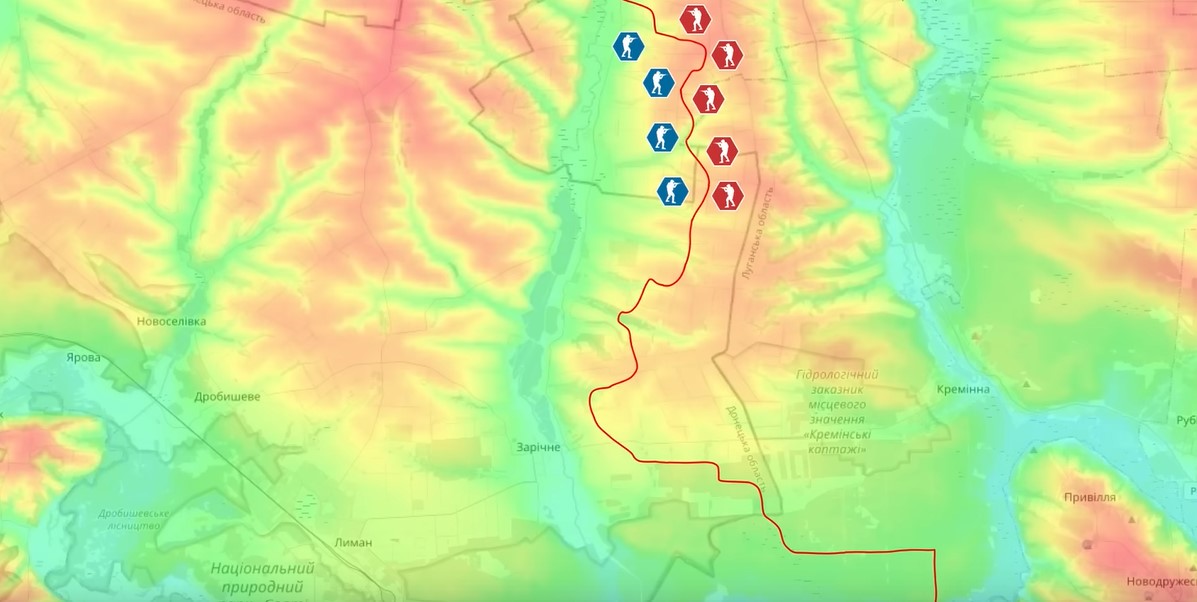Frontline report: Thermobaric strikes and kamikaze drones in the Lyman direction
Russian forces are channeling their supplies to the north in the Lyman direction to facilitate an advance on Nevs'ke. However, Ukrainians acted fast and now threaten to undermine the Russian breakthrough through an uppercut maneuver


An interesting situation has developed in the direction of Lyman. Here, Russians have channeled all their supplies to the north to facilitate an advance on Nevs’ke. However, Ukrainians acted fast and now threaten to undermine the Russian breakthrough up north through an uppercut maneuver putting the entire Russian offensive effort in jeopardy.

For over one and a half years, Russians have tried to eliminate the Ukrainian bridgehead on the eastern bank of the Zherebets river but with little progress and heavy losses to show for it. Now Russians are trying a new approach, taking control of the Ukrainian settlements along the river, and most importantly, their bridges. Taking control of the bridges would undermine Ukrainian logistics and slowly force Ukrainians to withdraw from their bridgehead.
Recently Russians have intensified their efforts up north in an attempt to break through and capture the Ukrainian town of Nevs’ke, which contains a bridge across the Zherebets river. A Ukrainian soldier operating in the Lyman direction also stated that Russians were supporting their effort with TOS-1A thermobaric rocket artillery strikes, a powerful weapon system of which Russians only have approximately 30 units left.

If we look at the topographic map we can see that Russians have control of the high ground, while Ukrainian positions are stuck in the lowlands. Ukrainians further south are in a similar situation with the settlements being in the lowlands. However a strong Ukrainian presence in the Serebryansky forest has allowed Ukrainians to dismantle most Russian attacks before they could ever reach Ukrainian lines.

At Nevs’ke, Ukrainians don’t have such an advantage, meaning that under the pressure of devastating thermobaric artillery strikes, and Russians launching a mechanized assault with reportedly over 30 armored vehicles, Ukrainians were gradually forced to pull back. Interestingly enough, despite their near overwhelming advantage, Russians were unable to fully secure the settlement even after Ukrainians pulled back.
Nevs’ke continues to be in the lowlands, meaning that now it is Ukrainian turn to utilize the high ground on the western bank of the river. As a Russian military blogger reported, Ukrainians conducted counterattacks halting the Russian advance. The Russians released a brief video showing a Russian flag flying above a destroyed house in the settlement. However this footage provides little meaningful information, as it is typical for Russians to prominently display their flag over any area they capture whether it be a village or a simple tree line.

Most importantly, in focusing their effort on Nevs’ke, a vulnerability in the Russian supply lines started to emerge further down south. Kremina functions as the main supply base for all Russian forces in this direction from Nevs’ke to the Serebryansky forest. This means that all Russian frontline positions in this area are fully reliant on supplies originating from the city.
The intensified Russian effort at Nevs’ke has inevitably led to a weaker flow of supplies to Russian positions in the fields and in the forest. This has put certain Russian positions that were already vulnerable to Ukrainian counterattacks in a precarious position and as Russians advanced into Nevs’ke, Ukrainians were able to retake several positions in the tree lines in front of Tors’ke.
If we look at the topographic map we can see that Ukrainians are trying to move further along the hill. If successful this would put Ukrainians in an extremely advantageous position allowing them to threaten Russian advances in the north and south and Russian supply lines in the east.

Russians understood this and immediately started moving tanks and manpower into position to counterattack the Ukrainian advance in a meeting engagement. Eventually, Russians managed to concentrate enough forces to launch a series of mechanized assaults on Ukrainian positions, using several armored personnel carriers, tanks, and even a turtle tank.
Unfortunately for the Russians, as can be seen from the footage taken by the observation drone, the area was already swarming with Ukrainian kamikaze drones. Ukrainians then promptly continued to show how they completely dismantled the Russian mechanized assaults, whereafter not even the turtle tank survived. One Russian vehicle supposedly managed to break through Ukrainian lines, but was left surrounded, cut off from reinforcements, and destroyed as well.
Overall, Ukrainians acted quickly, and successfully fought off the Russian counterattack in front of Tors’ke. This will allow Ukrainians to continue to pressure and threaten Russian supply lines toward the Russian effort at Nevs’ke. Although Russians did reach the settlement of Nevs’ke, Russian control here is extremely weak due to Ukrainian positions uphill and Russians now being in the lowlands.

Admittedly, we have seen this before. Russians launch costly assaults to take Ukrainian positions in the lowlands, overextend their supply lines, and get slowly worn down by Ukrainians on the opposing high ground. In the coming days and weeks we will likely see Russians taking a high number of losses to Ukrainian drone strikes setting the stage for the counterattacks on the devastated Russian units.
In our regular frontline report, we pair up with the military blogger Reporting from Ukraine to keep you informed about what is happening on the battlefield in the Russo-Ukrainian war.


